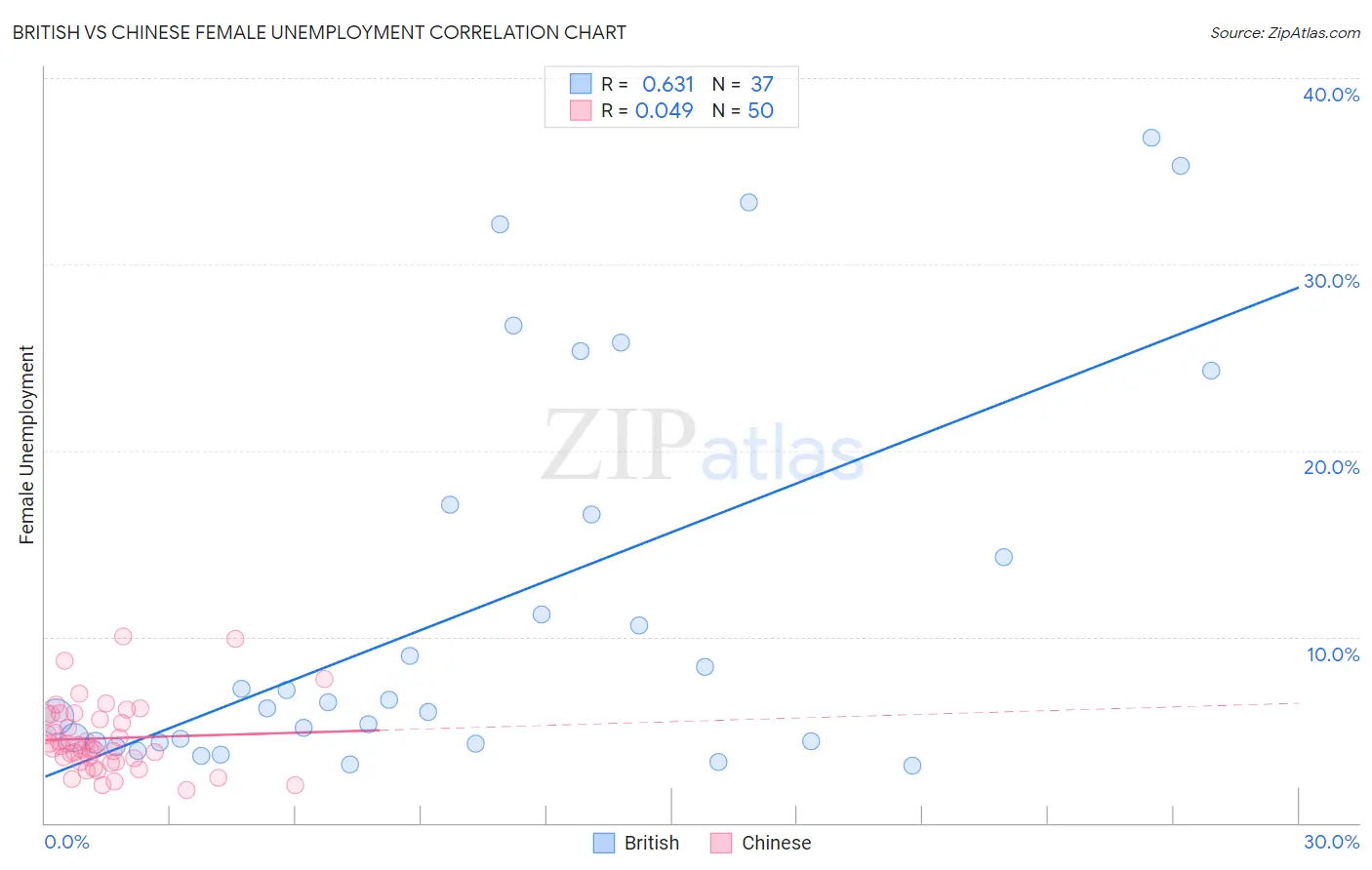British vs Chinese Female Unemployment
COMPARE
British
Chinese
Female Unemployment
Female Unemployment Comparison
British
Chinese
4.7%
FEMALE UNEMPLOYMENT
99.9/ 100
METRIC RATING
27th/ 347
METRIC RANK
4.5%
FEMALE UNEMPLOYMENT
100.0/ 100
METRIC RATING
7th/ 347
METRIC RANK
British vs Chinese Female Unemployment Correlation Chart
The statistical analysis conducted on geographies consisting of 523,107,564 people shows a significant positive correlation between the proportion of British and unemploymnet rate among females in the United States with a correlation coefficient (R) of 0.631 and weighted average of 4.7%. Similarly, the statistical analysis conducted on geographies consisting of 64,725,695 people shows no correlation between the proportion of Chinese and unemploymnet rate among females in the United States with a correlation coefficient (R) of 0.049 and weighted average of 4.5%, a difference of 5.7%.

Female Unemployment Correlation Summary
| Measurement | British | Chinese |
| Minimum | 3.1% | 1.8% |
| Maximum | 36.8% | 10.0% |
| Range | 33.7% | 8.2% |
| Mean | 11.7% | 4.5% |
| Median | 6.5% | 4.1% |
| Interquartile 25% (IQ1) | 4.3% | 3.3% |
| Interquartile 75% (IQ3) | 16.8% | 5.8% |
| Interquartile Range (IQR) | 12.5% | 2.5% |
| Standard Deviation (Sample) | 10.5% | 1.9% |
| Standard Deviation (Population) | 10.4% | 1.9% |
Demographics Similar to British and Chinese by Female Unemployment
In terms of female unemployment, the demographic groups most similar to British are Immigrants from Bosnia and Herzegovina (4.7%, a difference of 0.17%), Immigrants from India (4.7%, a difference of 0.20%), Welsh (4.7%, a difference of 0.29%), Scottish (4.7%, a difference of 0.50%), and European (4.7%, a difference of 1.1%). Similarly, the demographic groups most similar to Chinese are German (4.5%, a difference of 0.020%), Slovene (4.5%, a difference of 0.38%), Swiss (4.6%, a difference of 1.7%), Scandinavian (4.6%, a difference of 1.8%), and Dutch (4.6%, a difference of 2.4%).
| Demographics | Rating | Rank | Female Unemployment |
| Chinese | 100.0 /100 | #7 | Exceptional 4.5% |
| Germans | 100.0 /100 | #8 | Exceptional 4.5% |
| Slovenes | 100.0 /100 | #9 | Exceptional 4.5% |
| Swiss | 100.0 /100 | #10 | Exceptional 4.6% |
| Scandinavians | 100.0 /100 | #11 | Exceptional 4.6% |
| Dutch | 100.0 /100 | #12 | Exceptional 4.6% |
| Belgians | 100.0 /100 | #13 | Exceptional 4.6% |
| Finns | 100.0 /100 | #14 | Exceptional 4.6% |
| English | 100.0 /100 | #15 | Exceptional 4.6% |
| Carpatho Rusyns | 99.9 /100 | #16 | Exceptional 4.7% |
| Croatians | 99.9 /100 | #17 | Exceptional 4.7% |
| Latvians | 99.9 /100 | #18 | Exceptional 4.7% |
| Poles | 99.9 /100 | #19 | Exceptional 4.7% |
| Bulgarians | 99.9 /100 | #20 | Exceptional 4.7% |
| Fijians | 99.9 /100 | #21 | Exceptional 4.7% |
| Europeans | 99.9 /100 | #22 | Exceptional 4.7% |
| Scottish | 99.9 /100 | #23 | Exceptional 4.7% |
| Welsh | 99.9 /100 | #24 | Exceptional 4.7% |
| Immigrants | India | 99.9 /100 | #25 | Exceptional 4.7% |
| Immigrants | Bosnia and Herzegovina | 99.9 /100 | #26 | Exceptional 4.7% |
| British | 99.9 /100 | #27 | Exceptional 4.7% |